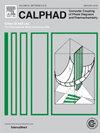Fe-Al-C三元合金中κ-碳化物双排序的CALPHAD建模
IF 1.9
3区 材料科学
Q4 CHEMISTRY, PHYSICAL
Calphad-computer Coupling of Phase Diagrams and Thermochemistry
Pub Date : 2024-09-28
DOI:10.1016/j.calphad.2024.102749
引用次数: 0
摘要
为了改进热力学预测,如平衡组成、Fe-Al-C 体系中κ-碳化物的相稳定性,提出了一种新的κ相四亚晶格模型,即 (Fe, Al)3(Fe, Al)1(C, Va)1(C, Va)3 。亚晶格模型解释了通过取代原子和间隙原子的同时有序化,从无序的 FCC 固溶体转变为有序的κ-碳化物的过程。双有序模型可以限制在 20 at% C 成分时产生的构型熵的不规则贡献,而这正是现有热力学数据库的一个问题。在进行 CALPHAD 评估时,κ-碳化物被视为与液体、奥氏体 (γ)、铁素体 (α)或 Fe-Al-C 体系中其他金属间相和碳化物相平衡的单一单相。密度泛函理论(DFT)计算的形成能表明,Fe3Al-L12 相比 Fe3AlC-E21 相在能量上更有利,而亚晶格 IV 中的 C 原子在能量上完全不利。在等温截面、液相投影、不变反应和低温相组成的计算中,所评估的参数比现有数据库提供了更好的精度。该模型非常适合低温(800 °C)相预测。因此,改进后的 Fe-Al-C 模型为κ-碳化物的热力学和动力学研究奠定了基础,有助于设计新的 Fe-Mn-Al-C 合金和优化热处理工艺。本文章由计算机程序翻译,如有差异,请以英文原文为准。
CALPHAD modeling of κ- carbide dual ordering in Fe-Al-C ternary alloys
A novel four-sublattice model for the phase, denoted as (Fe, Al)3(Fe, Al)1(C, Va)1(C, Va)3 was proposed to improve the thermodynamic prediction, such as equilibrium composition, phase stability of -carbide in Fe-Al-C system. The sublattice model explains the transformation from the disordered FCC solid solution to the ordered -carbide via concurrent ordering of substitutional and interstitial atoms. The dual ordering model can restrict the irregular contribution of configurational entropy arising at 20 at% C composition, which is an issue with the existing thermodynamic databases. For the CALPHAD assessment, -carbide was considered as a single, individual phase that is in equilibrium with the liquid, austenite (), ferrite () or other intermetallic and carbide phases in the Fe-Al-C system. The formation energy calculated from density functional theory (DFT) showed that Fe3Al–L12 phase is energetically more favorable than the Fe3AlC–E21 phase, and C atoms in sublattice IV are not energetically favorable at all. The assessed parameters provided better accuracy than the existing database in the calculations of isothermal sections, liquidus projection, invariant reactions, and low-temperature phase compositions. The model is highly suitable for the low temperature (<800 °C) phase predictions. Thus, the improved Fe-Al-C model lays the foundation for the thermodynamic and kinetic studies of -carbide for designing new Fe-Mn-Al-C alloys and optimizing the heat treatment processes.
求助全文
通过发布文献求助,成功后即可免费获取论文全文。
去求助
来源期刊
CiteScore
4.00
自引率
16.70%
发文量
94
审稿时长
2.5 months
期刊介绍:
The design of industrial processes requires reliable thermodynamic data. CALPHAD (Computer Coupling of Phase Diagrams and Thermochemistry) aims to promote computational thermodynamics through development of models to represent thermodynamic properties for various phases which permit prediction of properties of multicomponent systems from those of binary and ternary subsystems, critical assessment of data and their incorporation into self-consistent databases, development of software to optimize and derive thermodynamic parameters and the development and use of databanks for calculations to improve understanding of various industrial and technological processes. This work is disseminated through the CALPHAD journal and its annual conference.

 求助内容:
求助内容: 应助结果提醒方式:
应助结果提醒方式:


